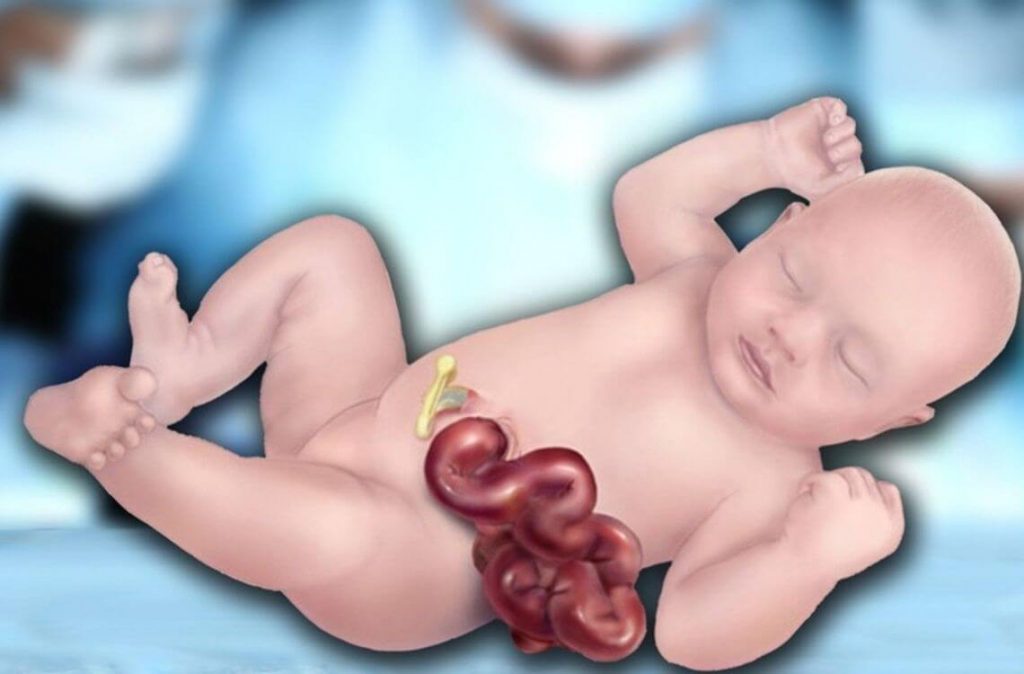Have you ever heard about gastroschisis? Gastroschisis is a birth defect in the abdominal wall (pronounced gas-troh-skee-sis) in which the intestines of the infant are located outside the body of the baby, leaving a hole next to the belly button.
The opening may be small or large and other organs including the stomach and liver may also be found outside of the body of the baby.
Besides, the intestines which are located outside the body of the baby are unprotected.
In other words, there is a risk of it being irritated, swollen and damaged.
What are the Causes of Gastroschisis?
The causes of gastroschisis are unknown among most newborns. Certain babies may have gastroschisis due to a difference in their genes or chromosomes.
However, recently researchers have reported major points on some factors that affect the risk of gastroschisis in a baby:
- Younger age: It was more likely that young mothers had a baby with gastroschisis than older mothers.
- Alcohol and tobacco: It was more likely that women who drank or smoked alcohol had a baby with gastroschisis.
Signs and Symptoms of Gastroschisis:
- A baby born with gastroschisis will lose heat and water from the intestines very quickly, allowing:
- Loss of water in the body (dehydration)
- The body temperature becomes too low (hypothermia)
However, how does the baby get diagnosed? Interestingly, when her baby has gastroschisis during pregnancy, the pregnant mother does not have any symptoms.
But before the baby is born, doctors can find gastroschisis through two methods.
- Ultrasound scan for routine screening (prenatal ultrasound)
- A blood test for a protein called alpha-fetoprotein which typically runs at a higher than average level when a baby has gastroschisis.
Can my baby survive this condition?
Yes, they can. However, the medical team needs to do a proper plan of action with several important steps for the baby and the mother.
First, they determine whether vaginal delivery or caesarean section (C-section) is better for the mother and the baby.
If required, they will arrange for surgery soon after birth. In certain cases, doctors must repair gastroschisis with surgery for the intestines to survive.
If the mum does not go into labour on her own, doctors will prescribe medications to induce labour.
What should I know more about this condition?
A baby with gastroschisis is fed via an intravenous (IV) line because the intestine is swollen and the swelling does not fit into the abdomen of the baby.
Also, since they are outside the body, nutrients are not well absorbed and may have been damaged during pregnancy or birth.
The medical team places the lower half of the baby and the intestines in a specialised plastic bag called ‘silo’ to:
- Keep the intestines from losing too much water
- Reducing the loss of heat
- Let the water pass out of the gut so that it shrinks to its normal size
- Allowing the intestines to pass slowly through the stomach
Things That Parents With Gastroschisis Babies Need To Be Aware Of:
Your baby needs time to heal after the surgery and return to normal functioning.
Because of this, babies with gastroschisis usually have feeding difficulties in the first few weeks of life.
During this time, your baby will receive IV nutrition and babies with gastroschisis will often need other treatments, including:
- Support from medications
- Antibiotics for infection prevention
- Careful attention to body temperature control
The baby will be released when the baby is doing well with breastmilk or milk feedings, and when the intestines can function normally.
My baby is smaller compared to other babies, should I be worried?
No, you should not at all. Babies with gastroschisis are usually smaller than normal.
It may take some time after birth for them to catch up developmentally.
Long-term problems mostly occur in very complex situations. These may be related to feeding, bowel or infectious problems.
Gastroschisis Babies Are Super-Babies!
Babies with gastroschisis may have very distinct experiences depending on how extreme each case is.
First of all, they must recover from their initial surgical repairs, excel in eating, and heal their intestines.
After that, most babies who have had gastroschisis will go on to live a regular, healthy life without complications linked to the disease.
Last but not least, all of the parents out there who are going through this journey will have tremendous patience and hope for your baby.
Do not worry. The journey may not be easy but we know you got this!
